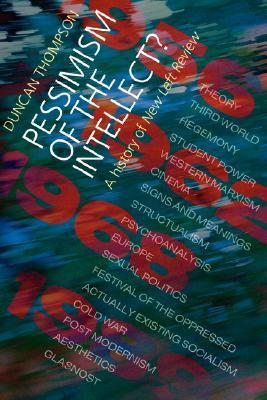What do you think?
Rate this book


204 pages, Paperback
First published August 1, 2006
As a radical political journal for an educated audience with no definite geographic emphasis aside from being published in English with British spelling conventions, it isn’t so strange that the New Left Review has received relatively scant academic attention. Whereas other properly academic journals typically exist as the expression of professional disciplinary associations, the New Left Review is not associated with any specific discipline or subdiscipline within the academy, and is not the organ of any specific disciplinary (or multidisciplinary) association. (Even Telos is vaguely associated with sociology.) Rather, the New Left Review is the expression of just whatever it is that long time editor Perry Anderson deems worth thinking about.
As far as I have been able to find, exactly 2 books have been dedicated to Perry Anderson’s thought: Gregory Elliott’s Perry Anderson: The Merciless Laboratory of History and Paul Blackledge’s Perry Anderson, Marxism, and the New Left. Exactly one book has been dedicated to the New Left Review itself, Duncan Thompson’s Pessimism of the Intellect?: A history of New Left Review. Given the dearth of sustained works of scholarship about it, Thompson’s book is indispensable by default. The intellectual biography of Perry Anderson is difficult to extricate from the history of the New Left Review; whereas Elliott’s book attempt to extricate Anderson from the NLR, Thompson has here attempted to extricate the NLR from Perry Anderson.
According to the book’s preface, the book began life as a dissertation under supervision of Gregory Elliott himself. Having read both books, one ultimately still gets very little sense of either Perry Anderson the man, or of the internal “life” of the NLR. Elliott’s book is, after all, an intellectual biography, a contribution to intellectual history and not a biography per se. But Thompson’s book is a little stranger - it appears as if his near exclusive source for his book was the NLR back catalog itself. A few unpublished NLR internal reports are cited, but it doesn’t appear that any interviews were conducted with members of the NLR editorial committee. Accordingly, any sense of overall narrative is absent from Thompson’s book - for instance, we simply learn that Ellen Wood parts ways with the journal without any clear indication as to why. The same goes for any number of editorial shake-ups - they just happen, and that is that.
Likewise for the revelation toward the end of the book about the trust that finances the Review’s operation - we learn that the previous 24 shareholders have been bought out at the same time we learn that there have been 24 shareholders all along. The nature of the Anderson family’s apparent wealth is never discussed in any depth but needless to say, it would seem that the Anderson family had quite a lot of it and moreover, would prefer not to talk about it.
There is also no real sense of the NLR’s sociological or cultural significance. Thompson alludes to the manifest failure of the NLR to ignite the theoretical capacity of the British proletariat repeatedly, but we do not get a strong feeling for the NLR’s influence within the left itself (British or otherwise). And thus we do not get many clues as to why, when the dust of 1989 settled by the end of the decade which followed it, the NLR was one of a handful of legacy institutions still carrying the torch of socialism (the Monthly Review being another journal notably under the supervision of a singular minded editor; Telos by then had reneged any commitments to the left).
One thus is left instead with an expansive synopsis of the contents of the New Left Review’s archive itself, with a special emphasis on texts authored by its own editorial committee, and Anderson in particular. While the emphasis of the books differ, Elliott’s monograph on Anderson is still probably the best starting point for anyone looking to gain familiarity with the New Left Review itself. And Thompson’s book is still worth reading as a companion to Elliott’s (not including the endnotes, Thompson’s book is just a smidge over 150 pages in length).
What I would like to see is a book that details the NLR’s overall place in the intellectual history of the Left. In 2025 the NLR is an established institution of the left. It is a respectable outlet for publication by academics; it is also available in Barnes and Noble. But who in, say, 1964 could have predicted its longevity so many decades later? Or its influence on the American academy relative to other non-denominational socialist journals such as the Monthly Review or Science and Society?